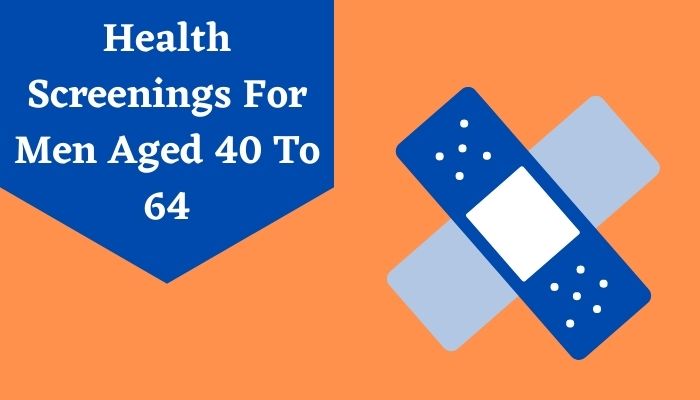Which are the most important medical tests for men between the ages of 40-64? There are numerous choices available when it comes to physical screening tests for men and other medical check-ups for men in 40 and upwards. Even when you feel fit and fine, you should not neglect your visits to your healthcare provider or doctor on a periodic basis. The main reason is that these visits will help you diagnose and find potential medical problems and fix them before they snowball into bigger issues down the line.

A man body screening or a full-body screening for men will help greatly in detecting any potential medical ailments while also helping assess risks for future issues. At the same time, it will enable better lifestyle habits and corrective measures to guard against future illnesses.
| Gender: Male |
| Age Group: 40-64 |
| Test Types- |
| Blood Pressure |
| Cholesterol |
| Colorectal Cancer |
| Dental Test |
| Diabetes |
| Eye Test |
| Infectious Disease Tests |
| Lung Cancer Screening |
| Osteoporosis Screening |
| Physical Examination |
| Skin Test |
| Prostate Cancer |
Top Medical Tests for Men Aged 40 to 64
Here are some of the recommended medical tests by age that you should not neglect:
1. Blood Pressure Screening
This is one of the important parts of physical screening tests. Men should get blood pressure checked once every couple of years at least. If the 120-80 ratio is not maintained, then annual check-ups are always recommended. Your doctor will tell you how to reduce blood pressure with lifestyle changes or medication if required.
Read More: How to Treat Your High Blood Pressure at Home With A Healthy Lifestyle
2. Cholesterol Tests
Men should start getting cholesterol tests from the age of 35 onwards, as per industry experts. Cholesterol should be checked once every five years and even sooner if needed. High cholesterol levels, kidney or heart problems, and diabetes are conditions that necessitate more frequent checks.
3. Colorectal Cancer Test
This is one of the necessary cancer screening tests for males and you should consult your doctor about taking the test if you are less than 45 years of age. You may require screening if there is a family history of polyps or colon cancer to deal with. Screening may also be needed if you have already had inflammatory bowel diseases. 45-75 is the age group when you should get tested for any signs of colorectal cancer. Colonoscopy may be required if there are risk factors such as a family history of the illness, ulcerative colitis, and history of polyp growth.
4. Dental Test
Visit the dentist at least once or twice annually for cleaning and examinations. The dentist will check the condition of your teeth and gums while determining the frequency of your visits.
5. Diabetes Checks
If you are more than 44 years of age, you should undergo screening once every three years. If you have a BMI over 25, then it means that you are overweight. You should get screened from 35 onwards if that is the case.
6. Eye Checkup
You should get eye tests done every 2-4 years between 40-54 and every 1-3 years if you are between 55 and 64. Examinations may be recommended periodically if you have risks of glaucoma or any vision related issues. If you have diabetes, then you should get this test done at least once every year.
7. Infectious Diseases
Periodic screening is a must for detecting possible infectious ailments such as Hepatitis C and even other infections such as HIV, chlamydia and syphilis to combat infections.
8. Lung Cancer Checks
Annual screenings are recommended for checking lung cancer risks with LDCT (low-dose computed tomography) in case certain conditions are met, namely your age is between 5-80 years, there is a smoking record and you have quit within the last 15 years or smoke presently.
9. Osteoporosis Tests
If you are between 50 and 70 years of age, then you will naturally suffer from risks linked to osteoporosis in various scenarios. These factors may include long-term usage of steroids, lower body weight levels, heavy usage of alcohol, post-50 fractures and a family history of the disease.
10. Physical Screening
Medical tests for men should cover the entire physical screening, especially blood pressure (once every year as per recommendations), blood sugar, cholesterol (once every five years if you have heart disease risks), weight, height, BMI and more. Your doctor may also enquire about your diet, substance usage, depression, and even aspects related to your lifestyle.
11. Prostate Cancer Check
Those between 55 and 69 years of age should consult their doctors about the intricacies involved in the examination. You should know whether screening is required, whether there are any side effects of these tests, whether there are higher risks of prostate cancer at your end (family history of the disease, particularly a brother or father, African-American descent, etc.), and so on. However, these are not routine examinations for those who do not have any symptoms.
12. Skin Tests
Doctors will be checking for risks of skin cancer and other related ailments. Those with weaker immunity may be susceptible to a variety of skin-related problems.
The Bottom Line
With an array of new diseases being diagnosed every now and then, health has become a matter of concern for us. More so with growing age, as we grow old. So, do get a list of recommended medical tests by age from your family doctor and get them done regularly.



